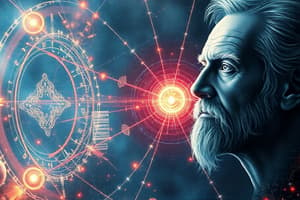Podcast
Questions and Answers
What does engineering physics or engineering science refer to?
What does engineering physics or engineering science refer to?
Engineering physics or engineering science refers to the study of the combined disciplines of physics, mathematics, chemistry, biology, and engineering, particularly computer, nuclear, electrical, electronic, aerospace, materials or mechanical engineering.
How does engineering science differ from traditional engineering disciplines?
How does engineering science differ from traditional engineering disciplines?
Engineering science/physics is not necessarily confined to a particular branch of science, engineering or physics, but is meant to provide a more thorough grounding in applied physics for a selected specialty.
What are some examples of specialties within engineering science/physics?
What are some examples of specialties within engineering science/physics?
Specialties within engineering science/physics include optics, quantum physics, materials science, applied mechanics, electronics, nanotechnology, microfabrication, microelectronics, computing, photonics, mechanical engineering, electrical engineering, nuclear engineering, biophysics, control theory, aerodynamics, energy, and solid-state physics.
What is the focus of engineering science/physics?
What is the focus of engineering science/physics?
How does engineering science/physics bridge the gap between theoretical science and practical engineering?
How does engineering science/physics bridge the gap between theoretical science and practical engineering?
Who discovered the Compton effect and in what year?
Who discovered the Compton effect and in what year?
What is the Compton effect and how does it deviate from classical theories?
What is the Compton effect and how does it deviate from classical theories?
What are the two ways in which photons can interact with matter at the atomic level?
What are the two ways in which photons can interact with matter at the atomic level?
What is the implication of the conservation of energy in the Compton effect?
What is the implication of the conservation of energy in the Compton effect?
What is Inverse Compton Scattering and when does it occur?
What is Inverse Compton Scattering and when does it occur?
Flashcards are hidden until you start studying
Study Notes
Engineering Physics/Science
- Refers to the application of physical principles and methods to engineering problems
- Interdisciplinary field that combines principles from physics, mathematics, and engineering to develop innovative solutions
Differences from Traditional Engineering
- Distinguishes itself from traditional engineering disciplines by its focus on fundamental principles and mathematical modeling
- Tends to be more theoretical and fundamental than traditional engineering, which often focuses on practical applications
Specialties within Engineering Science/Physics
- Examples include quantum mechanics, relativity, statistical mechanics, and electromagnetic theory
- Also includes materials science, nanotechnology, and biophysics
Focus of Engineering Science/Physics
- Focuses on understanding the underlying physical principles that govern the behavior of systems and devices
- Aims to develop new technologies and solutions by applying these principles
Bridging the Gap between Theory and Practice
- Engineering science/physics bridges the gap between theoretical science and practical engineering by applying theoretical principles to real-world problems
- Provides a fundamental understanding of the underlying physics, enabling the development of innovative solutions
Compton Effect
- Discovered by Arthur Compton in 1923
- Refers to the phenomenon where the wavelength of light increases after it scatters off free electrons
- Deviates from classical theories, which predict that the wavelength of light remains unchanged
Photon-Matter Interactions
- Photons can interact with matter at the atomic level through two ways: scattering and absorption
- Scattering involves the deflection of photons, while absorption involves the transfer of energy from photons to atoms
Conservation of Energy
- The conservation of energy implies that the energy lost by the photon is gained by the electron
- This principle is fundamental to the Compton effect, as it explains the energy transfer between photons and electrons
Inverse Compton Scattering
- Occurs when a low-energy photon scatters off a high-energy electron, resulting in a increase in the photon's energy
- The inverse of the Compton effect, where the photon's energy is increased rather than decreased
Studying That Suits You
Use AI to generate personalized quizzes and flashcards to suit your learning preferences.





